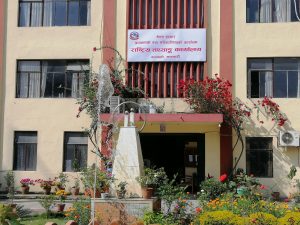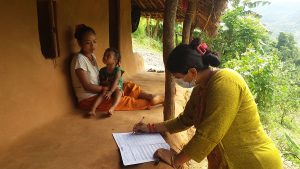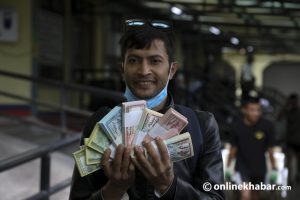On May 29, Amar Baduwal reached the Nepal Red Cross Society’s blood bank in Kalimati of Kathmandu from Kathmandu Model Hospital, Bagbazaar, searching for B+ve blood for his wife who was giving birth to their first child.
“But, it was not available there. Neither were any fresh donors available. Therefore, the staff there told me to find a fresh donor on my own and bring him/her there in order to manage the blood.”
After that, Baduwal contacted his family and friends. Luckily, he found the donor on time. Baduwal recalls, “We then quickly rushed to the blood bank and they collected the blood, performed several tests, purified it, and provided to the patient.”
It took around six hours to manage blood for Baduwal’s wife which otherwise would take some minutes in the normal days. He imagines, “If it was an emergency case, anything would have happened.”
There are many like Baduwal, who are hit hard by the blood shortage induced by the Covid-19 pandemic and subsequent lockdown in most parts of the country. But, not everyone is fortunate enough like him to get the blood managed on time. The shortage of blood has been an inevitable reality, report blood banks, adding there are neither sufficient donors nor donation camp organisers these days due to the coronavirus infection fears.
Factors leading to failure
Dibya Raj Poudel, the director at Central Blood Transfusion Service under the NRCS, thinks as almost every locality and household is affected by the coronavirus, many people, even the regular donors have not been able to make up to donation camps, blood banks and hospitals for donating their blood. Also, the fear of contracting the virus has restricted many people from coming forward for donations.
On the other hand, Dharma Datta Bidari, the NRCS information officer, says, “The restriction on public mobility has also stopped the possible and regular donors from coming to the Red Cross branch or donation camps to donate the blood. Many enthusiast donors, mostly students, have gone to their villages and hometowns from Kathmandu. That is why the collection has significantly dropped.”

Sweta Shrestha, who herself is a regular donor and is also engaged in organising many blood donation campaigns at the personal level as well as in collaboration with other organisations since the beginning of this year, says she has been able to conduct only five emergency camps after the prohibitory order was imposed in the Kathmandu valley in the last week of April this year.
In one year before that, she had successfully conducted 32 camps in the Kathmandu metropolitan city and Budhanilkantha municipality and collected 529 pints of blood altogether. Prior to the second wave of the Covid-19 pandemic, there used to be a collection of about 40 pints of blood at a camp, but now, the collection is limited to 15 utmost, informs Shrestha.
Kamal Bastola, the chairperson of the Blood for Nepal, a project of Lions Club of Kathmandu Matribhumi, also shares a similar experience. “In the ongoing lockdown, our team has been organising camps at least once a week by calling the regular donors and donors on our contact list. Currently, we have been able to collect as many as 20 blood pints only in a day, which in normal times would be around 60.”
Shrestha states, “We are facing many challenges in organising camps. Side by side, now, it has been quite expensive as well, due to the additional expenses of masks, sanitisers, PPE sets, disinfectors, and transport. Also, the families of some regular donors do not allow them to go out, even for blood donation.”
Severe shortage
Bidari, hence, informs his office is facing a tough time managing blood and blood components demanded.
During ‘normal days’, there used to be scheduled blood donation programmes in different parts of the country in collaboration with different organisations like Lions Club, Rotary Club, Marwari Sewa Samiti, academic colleges, local youth clubs and other community organisations every day. Around 400 pints of blood would be collected on a daily basis. However, such programmes are being organised on a very small scale nowadays, hence, the collection has dropped to a maximum of 20, according to Bidari.
Further, Poudel adds, “The supply of blood has dropped by 35 per cent. In normal times, about 250 units of blood are supplied in a day, however, as of now, we have been able to supply only 70-80 units a day.”

Similarly, an official at the blood bank of Paropakar Maternity and Women’s Hospital (Prasuti Griha) also confirms the current shortage of blood and blood components citing the pandemic and subsequent lockdown.
Likewise, Kiran Yogi of the Himal Hospital Blood Transfusion Centre says, “We used to conduct blood donation programmes massively in the corporate areas, colleges, and institutes in the past. The collection also used to be in very high numbers. Even though we have been organising camps in collaboration with different organisations these days, the collection has not been like before.”
Difficulty to meet the demand
The NRCS’ Bidari informs although there is a slight decline in the demand for blood as of now, the blood banks have been struggling to meet the need for dialysis, cancer treatment, childbirth, and many other cases.
Considering the blood shortage, the NRCS–through its social media pages, websites and other mediums–has been requesting people to voluntarily donate blood. It has also asked its staff and regular donors to provide the support, according to Bidari.
“If the blood is available with us, we will immediately provide it as it used to happen earlier,” Bidari explains, “But if we don’t have the stock, depending on the urgency and the seriousness of the patients, we will immediately search for a fresh donor and ask the relative of the patient to search donors from their side as well. We also request various donor agencies to find the donor.”

Additionally, the NRCS Central Blood Transfusion Service and Himal Hospital Blood Transfusion Centre are also managing the demand by asking for the replacement of the blood and blood components that it provides. That means they ask the patient’s eligible relatives to donate the blood to the blood bank in exchange for the blood the bank provides.
Further, the Himal Hospital has also launched a “one family one blood donor” campaign with the aim of encouraging voluntary blood donation.


























